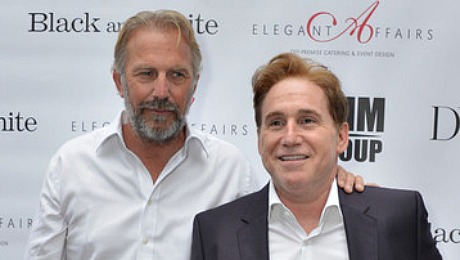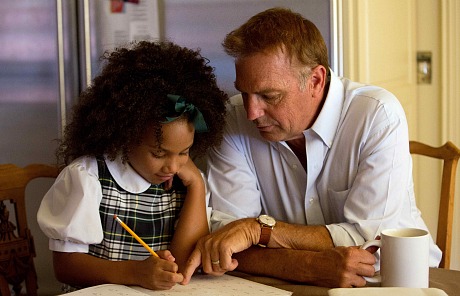Two weeks ago I sat down with Black and White director-writer Mike Binder at his West Los Angeles office and talked about a lot of things. The film, the chasm between black and white culture, his new novel-writing career, his recent decision to move away from dramadies and into more plot-driven material with a little “bounce,” Richard Linklater‘s Boyhood, the relentless glossiness of BET, alcoholism, watching screeners vs. seeing films with a paying audience, etc. It’s an open, relaxed, no-bullshit discussion — one of the most engaging I’ve ever posted on this site.

I think we all understand by now that Black and White is about a child-custody battle over a young African-American girl (Jillian Estell), and that the heart of the conflict is an argument jointly waged by her somewhat unstable, drug-dabbling father (Andre Holland) and her paternal grandmother (Octavia Spencer) that she needs to be raised by her own people. On the other hand her white attorney grandfather (Kevin Costner), who’s been raising her for years with his recently deceased wife (Jennifer Ehle) following the death of the girl’s mom, is determined to keep her in a more stable (i.e., drug-free) environment, which is ironic given that grandma’s death has turned grandpa into a raging boozer.
What I learned during our talk is that Binder is drawing from a personal history with a mixed-culture upbringing. Back in the late ’80s Binder’s in-law Maria Murphy, the sister of his wife Diane Murphy, died from an accidental infusion of HIV during a medical procedure, and it was left to Binder and his wife to raise Maria’s half-African-American son, Sean, who was 7 at the time. But it wasn’t a 100% proposition as Sean spent a lot of time with his absent father’s family in South Central. Sean is doing well today and living in Tampa, Florida. Binder says, “I’ve been wanting to write this story for a long time. The custody battle and the father with the drug problem…it comes from a real place.”
A few random Binder quotes:
“I gave the script to Costner’s manager J.J. Harris. Don’t show it to kevin, but tell me if you think he’d take this on. Talk to me, don’t give it to Kevin. Two days later she said, ‘He’s gonna call you tonight…he’s read it, he wants to do it.’ He said to me, ‘I want to do a great conversation about race in the country. When I read Field of Dreams I said to myself that nobody’s ever written about baseball this way, and I felt the same way abut this. And I don’t want to fuck with it.’
“[Racial tension] is always in the air. It never leaves the air. You know what the solution will be? We’re going to age ourselves out of it. We’re all going to get old and die, and our kids are post-racial…Barack Obama said about his daughters, they’re better than Michelle and I. I feel that way about my kids.”

“The first thing I noticed when I started showing this to black audiences…when we did a focus group we wanted to understand the reactions, and the moderator said what would you say to the filmmaker, and the overriding thing was ‘I’m glad this exists.’ Except for some journalists who said, ‘Why is this father a drug addict?’ And I said, ‘Why don’t I have the right to depict that? It’s honest. What do you want Reggie to be, a rocket scientist who’s too busy to come home for dinner?’
“We want our movie to speak to both earths, both cultures. You don’t see a lot of movies in which there are white characters and black characters on an even keel.
“I’ve written a novel called Keep Calm, a thriller set in London, an American framed for a terrorist bombing at 10 Downing. It’s a reversal of Day of the Jackal when they knew that there was an Englishmen out to assassinate DeGaulle. Here they know he’s been framed and they have to find him because because they know he’s going to be killed. I just cold-called John Grisham’s agent, a guy at Doubleday, sent him an email, I’ve written this book, look at it, and he said I want to represent this thing, I think I can sell it. It;’s coming out in the spring. I’ve also written a script called Disappear, a guy on the run with a lot of physicality and movement and very much a story. That’s my next film.
“I’m trying to put some real pacing and action in my stories now. I’m not that interested in just character pieces now. Nobody wants to make the kind of movies I did a few years ago. I had this movie called Emperor of Michigan. I loved it, so happy and proud of it [but] I could’t get the financing. They said to me, ‘Your movies are kind of dramadies and kind of slow.’ They only want the big broad. They don’t care about material that speaks to them. Brad Grey, Amy Pascal, the new guy at Warner Bros….every one of them watched
“But if I’m going out to the movies, I want something with a little bounce. Maybe it’s because I can get such good characters and good drama on television. But in a theatre I want to laugh, I want the film to move, I want it a little something extra. I’d never want to to do a Marvel movie or The Expendables, but people think of me doing these nice little character dramas, and now I want to change those perceptions a little bit.”
Again, the mp3.













